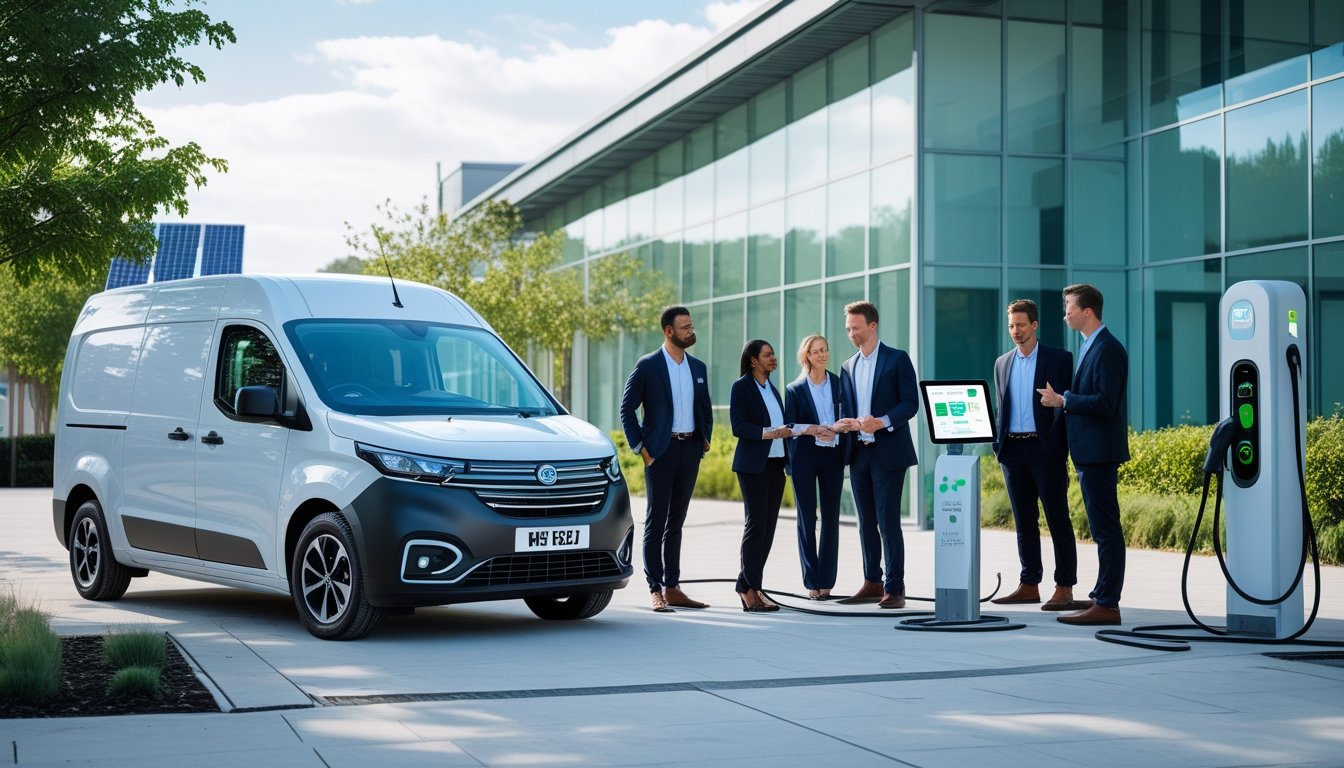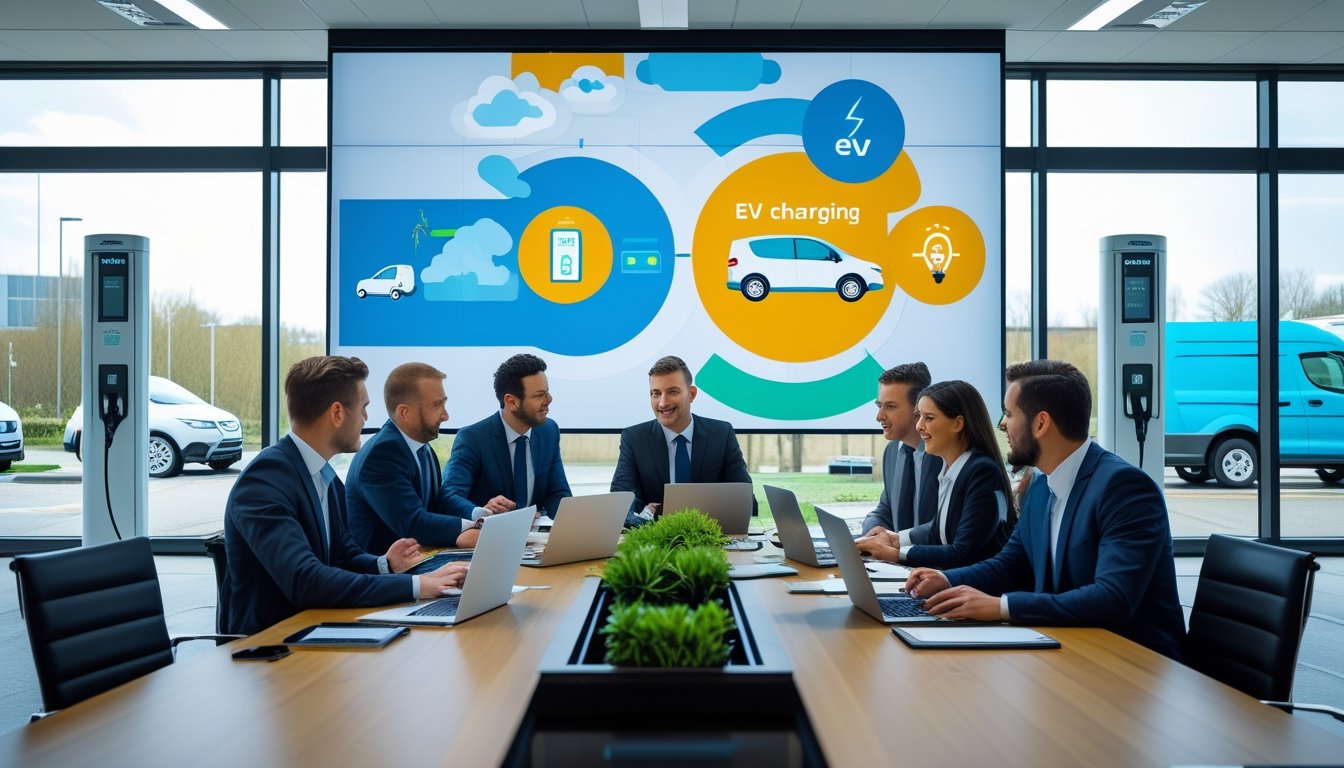Late updated: 10 May 2025 16:05
Written by: Amber Collins
Innovative EV Solutions For UK Businesses: Transforming the Future of Transportation
In the UK, businesses are increasingly turning to innovative electric vehicle (EV) solutions to stay ahead in the competitive market and to reduce their carbon footprint. There is a rapidly growing sector of dynamic companies specialising in cutting-edge EV technologies, making it easier for businesses to integrate electric mobility into their operations. Equipping your business with efficient EV solutions ensures both operational efficiency and an alignment with sustainable practices.

Companies like Equans and TOFCO are shaping the future of business with their bespoke solutions tailored to commercial and industrial needs. These firms deliver comprehensive services, from consultancy to the deployment of charge points and management systems, allowing businesses to seamlessly adopt EV technologies. This strategic shift not only contributes to a greener planet but also supports long-term growth and innovation within the UK economy.
By capitalising on these solutions, businesses support the UK's transition to a more sustainable future while gaining a competitive advantage. As the nation continues to witness growth in advanced manufacturing and smart charging infrastructure, there has never been a better time for UK enterprises to embrace these changes and drive forward with electric mobility.
Key Takeaways
- UK businesses are adopting innovative EV solutions for sustainability.
- Bespoke services are enhancing operational efficiency.
- Electric mobility offers competitive advantages in the market.
Key Innovative EV Solutions for UK Businesses

In the evolving landscape of electric vehicles, UK businesses are embracing advanced charging infrastructure, smart and fast charging solutions, and emphasis on seamless installation and user experience. These innovations not only enhance the efficiency of business operations but also support sustainability goals.
Advanced EV Charging Infrastructure
Our focus on advanced EV charging infrastructure supports the growing demand for electric vehicles in the UK. By implementing robust and scalable solutions, businesses can accommodate more EVs while ensuring reliable access to charging. Integrated systems allow for easy management and monitoring, providing businesses with data insights to streamline operations and make informed decisions.
Innovative infrastructures include flexible charging stations that can be tailored to specific business needs. This flexibility ensures that they can support fleets of varying sizes and types. Collaborations with EV manufacturers also facilitate the provision of customised solutions, integrating seamlessly with existing structures.
Smart and Fast Charging Solutions
To meet the needs of busy professionals and fleet operators, smart and fast charging solutions are vital. Smart charging systems optimise energy consumption, balancing load requirements to avoid grid overloads. These systems can automatically adjust charging schedules, taking advantage of off-peak electricity rates, which reduces costs significantly.
Fast charging solutions reduce downtime, allowing vehicles to be back on the road quickly. For example, some fast chargers can provide 80% charge in as little as 30 minutes. Smart integrations with cloud-based platforms permit remote monitoring and management, adding another layer of convenience and efficiency.
Seamless Installation and User Experience
Seamless installation and an intuitive user experience are critical components for successful EV charging solutions. Our approach ensures that charging systems are easy to install with minimal disruption to daily business operations. Turn-key solutions offer businesses a hassle-free way to implement EV infrastructure, supported by expert consultation and technical support.
User experience is elevated through clear interface designs and user-friendly technology, making it simple for employees and clients to charge their vehicles with minimal fuss. Consistent maintenance and updates help ensure that the charging experience remains smooth and efficient, keeping the focus on business priorities rather than technical issues.
Driving Sustainable Growth with Electric Mobility
Electric mobility is reshaping the landscape of business transportation in the UK, promising enhanced sustainability and efficiency. It's essential that we explore how EV solutions can support fleet operators, integrate with renewable energy sources, and improve accessibility for all drivers.
Supporting Fleet Operators in the Energy Transition
Fleet operators are pivotal in reducing carbon footprints by transitioning to electric mobility. We must focus on solutions that simplify this shift. Many businesses are now investing in electric vehicles (EVs) due to lower emissions and operating costs.
Providing fleet operators with easy access to home charging and smart charging infrastructure ensures economic and environmental benefits. Tailored fleet management software tracks energy use and optimises routes, minimising downtime and costs. This also aligns with the broader goals of sustainable growth through the energy transition.
Integrating Renewable Energy with Charging Systems
Integrating renewable energy with EV charging systems is crucial for sustainable development. By using solar panels and wind turbines, we can harness clean energy to power charging stations directly. This reduces dependence on non-renewable sources and enhances grid stability.
Smart charging technology enables dynamic energy management. It matches charging activity with peak renewable output times, maximising efficiency. The collaborative approach further strengthens our commitment to energy sustainability and positions businesses as leaders in the green economy.
Enhancing Accessibility for EV Drivers
To drive growth in electric mobility, we need to ensure accessibility for all EV drivers. This involves expanding public charging infrastructure, particularly in underserved urban and rural areas. Strategically placed charging stations reduce range anxiety and encourage wider EV adoption.
We should also focus on technological advancements that simplify the charging process. Using mobile apps, we can provide real-time data on charging station availability and allow seamless payment methods, enhancing convenience for drivers. By doing this, we support a comprehensive approach to fostering a sustainable and inclusive electric vehicle ecosystem.
Frequently Asked Questions

In exploring innovative EV solutions for UK businesses, key considerations include understanding available charging solutions, integrating these into existing infrastructures, and the financial elements, including costs and incentives associated with installations.
What are the leading electric vehicle charging solutions for UK businesses?
UK businesses can choose from a variety of charging solutions tailored to their needs. Options include fast chargers ideal for fleet operations and rapid chargers for customer-facing environments. Smart charging technologies are also gaining traction, enabling efficient energy usage and cost control.
How can UK businesses integrate EV charging into their existing infrastructure?
Integrating EV charging requires assessing current electrical capacity and space availability. Businesses often collaborate with professional installers to design systems that fit their specific operations without significant disruptions. This integration makes EV charging more seamless and efficient.
What are the cost implications of installing EV charge points for commercial use?
Costs can vary based on the type and number of chargers installed. Initial expenses might include equipment and installation, yet businesses could reduce these through government grants. Ongoing costs such as maintenance and electricity should also be considered for overall budgeting.
How do government incentives impact the adoption of EV solutions by UK businesses?
Government incentives play a crucial role in encouraging adoption by reducing upfront costs. Schemes like the Workplace Charging Scheme provide grants to support installation costs, making EV infrastructure more financially accessible to businesses across the UK.
What is the process for a UK business to obtain an EV charging station?
To obtain an EV charging station, businesses typically start by identifying suitable locations and types of chargers. They then consult with approved installers, apply for any available grants, and proceed with the installation. This process ensures compliance with regulations and standards.
How does the installation of EV charge points enhance corporate environmental responsibility?
Installing EV charge points demonstrates a commitment to sustainability. It reduces the carbon footprint of company operations by supporting the adoption of electric vehicles. This move aligns businesses with broader environmental goals and can improve their public image and attract eco-conscious customers.
